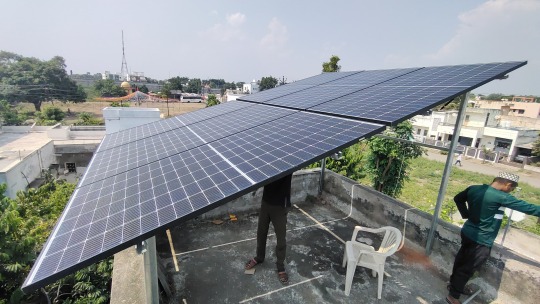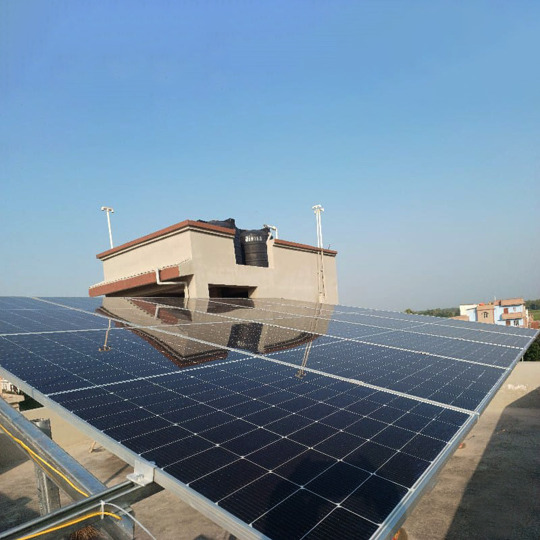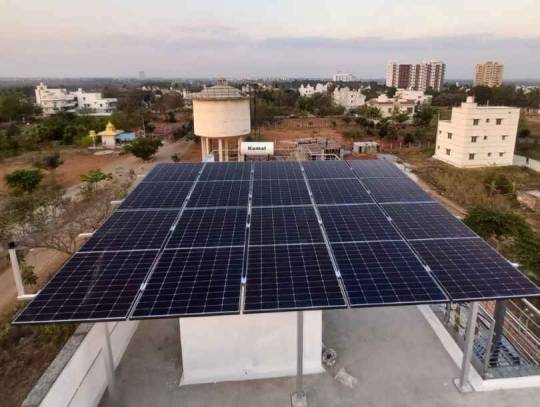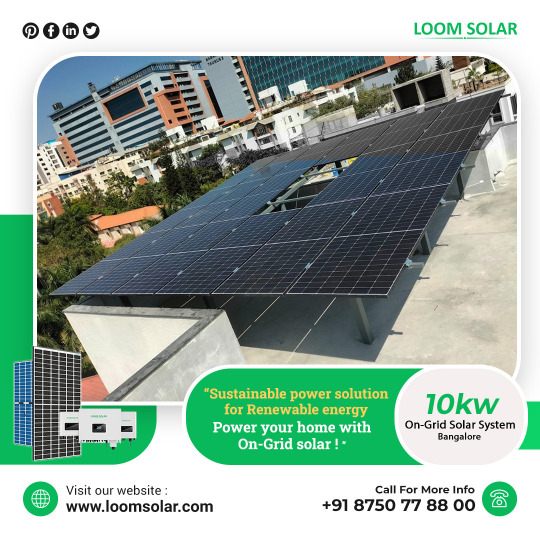Don't wanna be here? Send us removal request.
Text
How Much Will Solar Panels Cost for Your Home in India
Harnessing the power of the sun is becoming an increasingly attractive option for homeowners in India. Solar panels offer a clean, sustainable way to generate electricity, potentially leading to significant savings on your monthly bills. But before you jump on the solar bandwagon, it’s crucial to understand the upfront costs involved. This article delves into the factors influencing solar panel prices in India and provides a roadmap to estimate the cost for your specific needs.
Factors Affecting Solar Panel System Costs
The price of a solar panel system for your home in India is not a one-size-fits-all figure. Several factors come into play, influencing the final cost:
System Size (kW):
This refers to the total power generation capacity of your system. A larger system (in kW) will generate more electricity but will also cost more.
Google Search found similar content, like this:
How does the size of the solar panel system affect the cost? | by Brenda Rose | MediumThe size of the solar panel cost for a 2500 sq ft house system has a substantial impact on the overall cost, as it dictates the amount of energy the system can . Your average daily electricity consumption and desired level of energy independence will determine the optimal system size.
Panel Type: There are three main types of solar panels available:
Monocrystalline: Most efficient, but also the most expensive (Rs. 43–63 per watt).
Polycrystalline: Less efficient but more affordable (Rs. 38–50 per watt).
Thin-film: Least efficient but lightest and most flexible (Rs. 32–42 per watt).
Brand and Efficiency: Different brands offer varying levels of efficiency and warranties. Higher efficiency panels (typically monocrystalline) will generate more electricity per square metre of roof space but come at a premium.
Government Subsidies:
The Indian government offers subsidies to promote solar power adoption. These subsidies can significantly reduce the upfront cost of your system. Check with your state nodal agency for the latest subsidy schemes.
Balance of System (BoS) Costs: This includes all the additional equipment needed for your system to function, such as inverters, mounting structures, cables, and monitoring systems. The cost of BoS components can vary depending on quality and brand.
Installation Labour: The cost of installation will depend on the complexity of your roof, the experience of the installer, and your location. Estimating Solar Panel System Costs in India Here’s a breakdown to roughly estimate the cost of a solar panel system for your home:
Calculate Your Daily Electricity Consumption: Look at your past electricity bills to determine your average daily consumption in kWh (kilowatt-hours).
Choose Your Desired Level of Energy Independence: Do you want to completely offset your electricity needs or just a portion? Aiming for 100% solar coverage will require a larger system.
Let’s say your daily electricity consumption is 5 kWh, and you want to offset 70% of your needs. A 5 x 0.7 = 3.5 kW system might be suitable. Assuming a monocrystalline panel price of Rs. 50 per watt, the panels themselves would cost 3.5 kW x Rs. 50/watt = Rs. 1,75,000.Adding a 40% BoS cost, the estimated BoS cost would be Rs. 70,000.Total estimated pre-subsidy cost: Rs. 1,75,000 + Rs. 70,000 = Rs. 2,45,000.Government subsidies can significantly reduce this cost. Let’s say the subsidy in your state is 30%. The final cost after subsidy would be Rs. 2,45,000 x (1–0.3) = Rs. 1,71,5000 Remember, this is just an example. The actual cost for your home will depend on the factors mentioned earlier.
Conclusion
Solar panel prices have proven to be a powerful and sustainable source of energy that is not only environmentally friendly but also economically beneficial. By harnessing the power of the sun, we can reduce our reliance on fossil fuels and move towards a cleaner, greener future. solar panels are a sustainable and efficient way to harness the power of the sun and generate clean energy. By investing in solar technology, we can reduce our reliance on fossil fuels and decrease our carbon footprint. With advancements in technology and decreasing costs, solar energy is becoming more accessible to homeowners and businesses alike. By shining a light on solar panels, we can pave the way towards a brighter and more sustainable future for generations to come.
0 notes
Text
Is a 3kW solar system enough for a house?
A 3kW solar system approximately has 10 solar panels with the capacity to generate 3000 watts. Most of the residential homes have AC appliances, to run those appliances and save on their electricity bills they consider installing solar panels. Every home has electric appliances such as fans, AC, coolers, lights, water pumps, and more. These consume a lot of electricity. To reduce those high electricity bills, the residential sector is adopting solar rooftop solar for their homes.
What can I run on a 3kW solar system?
A 3kW solar power plant can run essential household appliances. This solar system is suitable for those consumers who are looking for a complete solar solution for homes with solar battery and solar inverter. To maximize the efficiency for better performance of the solar panel, consider an energy-saving appliance and try to use it during the peak hours of sunlight. This solar system can be suitable to run AC and other appliances easily. According to an expert’s recommendation, a 3kW solar system can run a maximum load of only 80% of inverter capacity. Let’s see what appliances can a 3kW solar system run.
5HP Water Pump (Submersible)
Refrigerator
Cooler
Single inverter AC
TV
Washing Machine
Laptop
Fans/ Lights
Iron Press
How many panels are required for 3 kw?
3KW means 3000Watts. If you choose a 3kW solar system, then you will have 10 solar panels. With the higher voltage option, you can get more solar panels.
How much does a 3kW solar system cost?
The average price of a 3kW solar system starting price can be high. The rooftop solar panel price starts from Rs.60,000 but the government provides Rs.18,000 per kW for up to 3kW. The government provides Rs.9,000 per kW for more than 3kW.
How much does 3kW solar produce?
This solar system can generate 3000W/h electricity which can run household appliances easily. This system can generate 12-15 units each day. It can save you up to Rs.84-105 per day approximately.
January
4.43
February
5.43
March
6.41
April
6.82
May
6.52
June
5.77
July
4.94
August
5.36
September
5.74
October
5.58
November
4.81
December
4.36
Can I run 1.5-ton AC on a 3kw solar system?
Yes, you can run 1.5-ton AC on a 3kW solar system. You can consider an AC module solar panel that can be connected to the power socket which will run both AC and DC power. 3kW solar power plant has a capacity of 14A which can run without a grid.
How to apply for a subsidy?
To apply for a rooftop solar subsidy you need to follow the steps which are as follows.
Step-1: Visit on solarrooftop.gov.in
Step-2: Click “Appy for rooftop solar”
Step-3: Register in the portal or log in with your consumer number & mobile number
Step-4: Fill in the details given in the form
Step-5: Wait for the DISCOM feasibility approval, then install the plant by the registered vendors.
Step-6: Once installation is done, submit the details to apply for a net meter.
Step-7: DISCOM will generate a commissioning certificate through the portal for net meter installation.
Step-8: After the report, submit your bank account details and a canceled cheque through the portal. The subsidy will come to your account within 30 days.
What are the eligibility criteria for a solar subsidy?
The eligibility criteria to get a solar subsidy on solar rooftops are as follows.
1. You must be a residential consumer (not commercial or industrial consumer)
2. The solar subsidy is only available for On-grid solar panel.
3. The subsidy amount for a 3kW solar system is Rs.43.764 by the central government. The state government provides a subsidy of Rs. 30,000 for the overall solar power plant in some states, which means you need to pay Rs. 43,764 to Rs. 73,764. The subsidy amount will be withdrawn in 30-60 days after the installation of the net meter.
Conclusion
I hope you have got the answer of your query. We are one of the leading solar panel manufacturer in India that manufacture solar panel, lithium battery, and solar inverter for residential, commercial, and industrial purposes. If you are looking for the best solar panel for home and want to know more, you can book engineer visit from our website.
0 notes
Text
Why Choose Solar Panels? Unveiling the Top Benefits for a Sustainable Future
In the quest for sustainable energy solutions, solar panels emerge as a clear choice for individuals and businesses alike. This blog explores the compelling reasons why choosing solar panels is a wise decision, delving into the multiple benefits that extend beyond cost savings.
Renewable and Abundant Energy Source: Solar panels harness energy from the sun, an abundant and renewable source. Unlike finite fossil fuels, sunlight is inexhaustible, providing a constant and reliable energy stream.
Reduced Electricity Bills: Emphasize the immediate financial advantage of installing solar panels – a significant reduction in electricity bills. By generating your own electricity, you can offset or eliminate your reliance on the grid, leading to substantial long-term savings.
Environmentally Friendly: Position solar panels as a clean and green energy solution. They produce no greenhouse gases, helping combat climate change and reduce your carbon footprint. Choosing solar power actively contributes to a healthier planet.
Energy Independence: Highlight the empowerment that comes with generating your own energy. Solar panels offer a degree of energy independence, reducing vulnerability to energy price fluctuations and supply chain disruptions.
Government Incentives and Tax Credits: Discuss the various financial incentives and tax credits available for solar installations. Many governments encourage the adoption of solar energy through subsidies, rebates, and tax incentives, making it an attractive and affordable investment.
Increased Property Value: Explore the added benefit of increased property value. Homes and businesses with solar panels are often more attractive to buyers, showcasing a commitment to sustainability and offering potential energy cost savings.
Low Maintenance and Longevity: Explain the minimal maintenance requirements of solar panels and their long lifespan. With few moving parts and durable materials, solar panels are a reliable and low-maintenance energy solution that can last for decades.
Technological Advancements: Discuss the continuous advancements in solar technology, leading to increased efficiency and reduced costs. The ever-evolving field of solar innovation ensures that adopting solar panels today positions you for the best in clean energy technology.
Conclusion: Summarize the key points and emphasize that choosing solar panels is not just an investment in clean energy but also a strategic decision for financial savings, environmental stewardship, and a sustainable future. Encourage readers to explore the possibilities of solar energy for their homes or businesses and take a proactive step towards a greener tomorrow.
0 notes
Text
Solar panel

Solar panels harness sunlight to generate electricity. Photovoltaic cells within the panels convert sunlight into direct current (DC) electricity, which is then converted into usable alternating current (AC) by an inverter. This clean and sustainable energy source reduces reliance on non-renewable resources, mitigating environmental impact. Solar panels are a crucial component in the transition to a more sustainable and eco-friendly energy landscape.
0 notes
Text

Solar Panel
Do you want to reduce your electricity bill or become energy independent? Loom Solar manufactures the widest range of best quality solar panels for home, school, factory, hospital, petrol pump, flour mill, and more at competitive prices with loan facilities in India. We have 50,000+ happy consumers across India, even rural areas.
0 notes
Text
The Best Solar Panels for Maximum Efficiency
In an era where sustainable energy solutions are gaining prominence, solar panels emerge as a beacon of eco-friendly power generation. Choosing the best solar panels for your needs is crucial for optimizing energy production and reducing your carbon footprint. This blog post serves as your comprehensive guide to understanding and selecting the most efficient solar panels available.
1. Understanding Solar Panel Basics:
Explaining how solar panels convert sunlight into electricity.
Differentiating between monocrystalline, polycrystalline, and thin-film solar panels.
Highlighting the importance of efficiency ratings and power output.
2. Factors Influencing Solar Panel Performance:
Location-specific considerations such as sunlight exposure and climate.
Impact of shading and how to mitigate its effects.
Evaluating the warranty and lifespan of solar panels.
3. Comparing Solar Panel Technologies:
In-depth analysis of monocrystalline vs. polycrystalline panels.
Exploring the benefits and drawbacks of thin-film solar technology.
Recent advancements and innovations in solar panel design.
4. Sizing Your Solar Panel System:
Calculating your energy needs to determine the right system size.
Considering available roof space and potential energy savings.
Balancing budget constraints with desired energy production.
5. Selecting a Reputable Solar Panel Manufacturer:
Researching and comparing manufacturers for quality assurance.
Reading customer reviews and testimonials for real-world insights.
Assessing the company's commitment to sustainability and environmental responsibility.
6. Financing and Incentives:
Exploring available financial options, including loans and leasing.
Understanding government incentives, tax credits, and rebates.
Calculating the return on investment for your solar panel installation.
7. Maintenance and Long-Term Care:
Practical tips for keeping solar panels clean and well-maintained.
Understanding common issues and troubleshooting techniques.
Maximizing the lifespan and efficiency of your solar panel system.
Conclusion: Investing in solar panels is not just about embracing renewable energy but also making a choice for a sustainable future. By considering the factors mentioned in this guide and staying informed about the latest solar technologies, you can confidently choose the best solar panels for your specific needs, contributing to a cleaner and greener tomorrow.
0 notes
Text

Solar panels harness sunlight to generate electricity. Comprising photovoltaic cells, they convert sunlight into direct current (DC) electricity. An inverter then transforms it into alternating current (AC) for use. This eco-friendly technology reduces reliance on traditional energy sources, mitigating environmental impact. As advancements improve efficiency and affordability, solar panels emerge as a sustainable solution, fostering a greener, cleaner future.
0 notes
Text
The Best Solar Panels in India for Sustainable Power
In the quest for sustainable energy solutions, choosing the right solar panel is crucial for harnessing the abundant sunlight in India. This blog explores the top-performing solar panels available in the Indian market, considering factors such as efficiency, durability, and technological innovations that contribute to a greener and more energy-efficient future.
Adani Solar - Adani Green Energy Limited: Highlight Adani Solar as a leading player, renowned for its high-efficiency monocrystalline and polycrystalline solar panels. Explore its commitment to sustainable practices and the adoption of cutting-edge technology in its solar solutions.
Tata Power Solar Systems Limited: Introduce Tata Power Solar as a trusted name, known for its extensive experience and commitment to providing efficient solar solutions. Explore their diverse product range, including rooftop solar solutions and large-scale projects.
Waaree Energies Limited: Showcase Waaree Energies as a leading Indian solar panel manufacturer with a strong emphasis on quality and innovation. Discuss their wide range of solar products and their contribution to India's solar power growth.
Goldi Green Technologies: Discuss Goldi Green Technologies as a prominent player known for its state-of-the-art solar panels and commitment to sustainability. Explore their focus on research and development to enhance solar technology efficiency.
RenewSys India Pvt. Ltd.: Introduce RenewSys as a notable manufacturer offering solar panels with a focus on efficiency and durability. Discuss their emphasis on sustainable practices and their contributions to India's solar energy landscape.
Loom Solar: Discuss Loom Solar's emergence as a disruptive force in the Indian solar market, known for its direct-to-consumer approach and innovative solar panel products. Explore their commitment to making solar energy accessible to all.
Canadian Solar: Acknowledge Canadian Solar as a global player with a strong presence in the Indian market. Explore their advanced solar technologies and diversified product range catering to various solar energy needs.
Risen Energy Co. Ltd.: Introduce Risen Energy as an international player gaining traction in the Indian market. Discuss their focus on technological advancements and high-performance solar panels contributing to India's sustainable energy goals.
Conclusion: Conclude the blog by summarizing the diverse options available for the best solar panels in India, emphasizing the importance of choosing a solution that aligns with individual energy needs and sustainability goals. Encourage readers to explore these reputable brands and contribute to India's solar revolution for a cleaner and greener tomorrow.
0 notes
Text

Loom Solar's advanced solar panels epitomize efficiency and reliability. With state-of-the-art technology, these sleek panels ensure optimal energy conversion, providing sustainable power for homes and businesses. Embrace a greener future with Loom Solar, a trusted name in innovative solar solutions.
0 notes
Text

Loom Solar's 400W solar panel offers an eco-friendly energy solution with cutting-edge technology. Efficient and durable, it harnesses sunlight to generate clean power for homes and businesses. Trust Loom Solar for high-performance solar panels that pave the way for a sustainable and cost-effective energy future.
1 note
·
View note